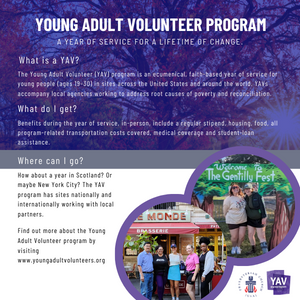By Erica Stewart
 I have noticed in the past few months that the world never stops. I’m sure you just chuckled at that sentence. But it sometimes feels that way in certain earth-shattering moments: the death of a loved one, the diagnosis of a life-threatening disease, the loss of your job. In my case, I thought these earth-shattering moments included leaving Italy after my semester abroad, my graduation, or leaving behind my new community and home after my year of service. Up until this point in my life, I had always been able to look forward to something: graduation, the end of the semester, a special vacation. I had a time frame. “After I do this,” I would tell myself, “I will…Start a diet. Find a significant other. Read more for pleasure. Run a marathon. Stop procrastinating.”
I have noticed in the past few months that the world never stops. I’m sure you just chuckled at that sentence. But it sometimes feels that way in certain earth-shattering moments: the death of a loved one, the diagnosis of a life-threatening disease, the loss of your job. In my case, I thought these earth-shattering moments included leaving Italy after my semester abroad, my graduation, or leaving behind my new community and home after my year of service. Up until this point in my life, I had always been able to look forward to something: graduation, the end of the semester, a special vacation. I had a time frame. “After I do this,” I would tell myself, “I will…Start a diet. Find a significant other. Read more for pleasure. Run a marathon. Stop procrastinating.”
New Year’s resolutions are a perfect example of attempts to better ourselves, as are the liturgical seasons of Lent and Advent, for those of us who are part of the Christian community. These are periods where we try start fresh, begin anew, and sometimes, attempt erase the mistakes of the past. Starting during my year of service in San Francisco and continuing through my time with CVN, I have learned to truly listen to myself. I try to ask myself questions like “What do I really want? Who do I want to spend time with? What do I stand for?” regardless of the season.
The singular most important thing I have learned this past year is this: be kind to yourself. Spending countless hours Facebook stalking some high-school classmate you don’t even speak to anymore won’t bring you joy. And it’s likely that third piece of pie won’t either. Not having a specified “next step” to go to after recruitment can sometimes make me feel stuck, like my earth is shattering. Fortunately, my mom recently told me about a book her boss’s daughter was reading called Magic. The book inspired her to wake up every morning and take time to list all the things in life that she was grateful for even before she swung her legs over the side of the bed. My parents and I adopted a similar practice, quite enjoying listing things in the mornings when I was home for Thanksgiving: being together for the holiday, the ability to finance my first car, or visiting with my grandma. We too often fall into negative habits, thoughts, or situations. And even worse, we fantasize about the worst-possible outcomes to our problems instead of imagining the positive solutions. It amazes me that people who have very little—sometimes nothing—can still survive through each passing day with a hope, found solely in Jesus Christ, that life will get better.
This weekend I had the privilege of witnessing this first-hand with students from Texas Tech University in a day of service with Catholic Charities. We visited the home of an elderly woman who had raised eight children as a single mom and was now living on her own. When we arrived at her home, she didn’t even wait for us to approach the door before yelling to us in the street that God had truly answered her prayers. “I don’t deserve this, there are plenty of other people who need the help more than I do,” she said as she prepared us food. She probably thanked us for coming to help clean her house upwards of fifty times.
 Her attitude impressed me. This woman had to work twice as hard to raise her family. What was beautiful was seeing how much, at the end of the day, family was what mattered to this woman. It drove her to take her GED, become a Licensed Vocational Nurse (LVN), and work long hours to support her family. Now she has fifteen grandchildren (“I counted the other day with a friend!” she told me, beaming) but sadly spends much of her time alone. Though she was left with a very clean house and a few hours of company, we were left not only with that good, fluttery feeling that comes from serving another, but also with a greater appreciation for faith and family. Her words, however, will forever remain imprinted in my mind: “when you have the Lord in your heart, nothing else matters.”
Her attitude impressed me. This woman had to work twice as hard to raise her family. What was beautiful was seeing how much, at the end of the day, family was what mattered to this woman. It drove her to take her GED, become a Licensed Vocational Nurse (LVN), and work long hours to support her family. Now she has fifteen grandchildren (“I counted the other day with a friend!” she told me, beaming) but sadly spends much of her time alone. Though she was left with a very clean house and a few hours of company, we were left not only with that good, fluttery feeling that comes from serving another, but also with a greater appreciation for faith and family. Her words, however, will forever remain imprinted in my mind: “when you have the Lord in your heart, nothing else matters.”
This week begins the liturgical season of Advent, a season where we prepare ourselves—physically, emotionally, socially, and most importantly, spiritually—for the birth of our Lord, who humbled Himself to walk among us as a man. What can we do to strive to be more Christ-like towards others? Because of my experiences, I have learned to be kinder to myself, to begin my day in gratitude and not categorize my life in time frames.The opportunities to be more Christ-like are endless, especially at this time of year so focused on giving. But at the end of the day, don’t leave people guessing. Tell them straight out, and ask them in return: what do you stand for?


 Thousands of faith-based service opportunities can be at your fingertips with the RESPONSE. Download the latest edition today!
Thousands of faith-based service opportunities can be at your fingertips with the RESPONSE. Download the latest edition today!
